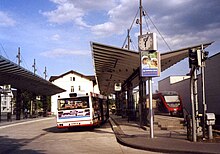RegioTakt
RegioTakt (RT) refers to the integral interval timetable (ITF) of regional buses in North Rhine-Westphalia and partly in Lower Saxony in local passenger transport . It is the counterpart to the ITF of regional rail transport ( NRW-Takt ). The term Regiotakt is also used elsewhere in rail transport (for example in Austria).
The aim is to bring passengers closer to a (reorganized) regional bus network with reliable, easily memorable departure times. The clock is based on direct bus connections at the connection points . The timetables are based on the usual symmetry minute (58½). A RegioTakt does not initially mean the integration of all means of transport into a whole. Exactly coordinated timetables with city traffic ( light rail , city bus, etc.) or regional rail traffic are not yet in the foreground.

The coordination of bus / rail has developed very differently from region to region. There are attempts to guarantee connections between the train and the Regiobus (connection guarantee). For this, a contact option for train and bus staff is necessary. Smaller train stations with few connection options are particularly suitable for this. The increasing technical possibilities of system networking have hardly been used to date. If there is a possibility for the bus driver to see the platform or a common platform for bus and train (combined platform ), connections are often granted.
A timetable coordination with city traffic, especially in larger cities, is also a task for the operators of the city lines. On the other hand, regional buses have to wait for connections to city lines. If the frequency is low, often only hourly, there is a guarantee of connection over the exact adherence to departure times.
The RegioTakt contrasts with the city and state clocks (rail traffic). There are similar developments in other federal states (for example Bayerntakt, Rheinland-Pfalz-Takt , Allgäu-Schwaben-Takt ). The unification into a whole is a task for the future - which has already been partially recognized, for example in Rhineland-Palatinate. But long-distance transport is also part of it: long-distance travelers also expect inexpensive connections to regional buses.